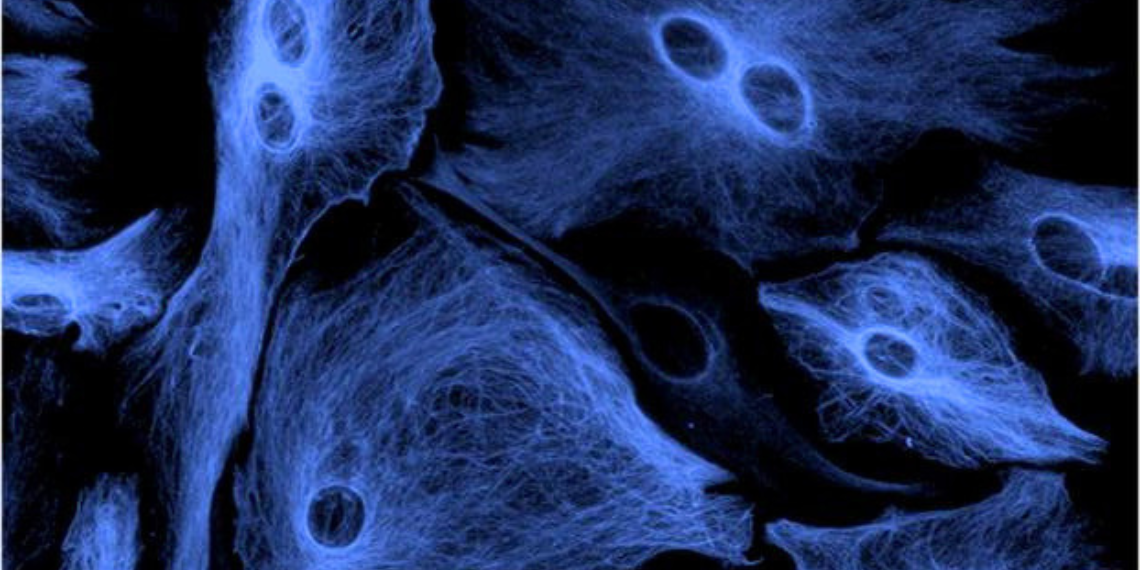“Overexcited” Astrocytes Help Explain Neuron Dysfunction in Fragile X Syndrome

It does not need to be said twice that how the brain works is complicated. But what happens when the brain isn’t quite circuited the way it is meant to be? Even a single mutation can have a huge impact on how we function.
People living with conditions such as Fragile X Syndrome, a genetic disorder that impacts cognitive and learning abilities, know this better than anyone. The big question then becomes: What causes the brain to circuit itself differently?
 Dr. Angela Scott and her team of graduate students in the Department of Molecular and Cellular Biology have found that a specialized type of brain cell known as astrocytes play a significant role in the development of Fragile X. Using a transgenic strain of laboratory mice introduced with the same type of genetic mutation, the group discovered that astrocytes in these mice don’t communicate properly with the neurons around them. This dysfunctional cell signaling leads to neurons growing abnormally and becoming overexcitable, impacting the brain’s ability to function.
Dr. Angela Scott and her team of graduate students in the Department of Molecular and Cellular Biology have found that a specialized type of brain cell known as astrocytes play a significant role in the development of Fragile X. Using a transgenic strain of laboratory mice introduced with the same type of genetic mutation, the group discovered that astrocytes in these mice don’t communicate properly with the neurons around them. This dysfunctional cell signaling leads to neurons growing abnormally and becoming overexcitable, impacting the brain’s ability to function.
“Fragile X on its own affects a lot of kids, which often come with comorbidities such as autism spectrum disorder. There is a need for models that encompass these syndromes for research,” explained Scott. “This animal model of Fragile X Syndrome is a great tool for understanding this condition.”
Previous research has shown that conditions such as Fragile X are mediated by abnormally growing and overexcitable neurons that don’t have efficient “off” switches. Scott’s lab is one of the first to demonstrate the critical role that astrocytes have in this process and molecular players potentially responsible for this.
“New roles are continually emerging in the cell biology of non-neuronal brain cells, such as astrocytes,” explains Scott. “It turns out, there is a lot to learn about these cells.”
While neurons are the classic “information messengers” in the brain, astrocytes are responsible for directing neuronal growth and activity, as well as the overall homeostasis of the central nervous system. So how are astrocytes able to impact neurons the way they do in Fragile X? It turns out that they themselves are overexcited and overproduce signaling molecules.
An easier way to picture these wayward astrocytes is like a young babysitter doling out lots of candy to their charges. The kids, a.k.a. the neurons, end up bouncing off the walls, not listening, screaming, kicking, fighting – a real home war zone. How is this chaos calmed? In come the parents who take the candy away, down come the kids from their sugar high, and calm is restored.
Just like parents removing the candy from the babysitter, there are potential therapeutic options currently used for other conditions that could help with slowing down the signaling by these dysfunctional astrocytes, which in turn may help calm overexcitable neurons.
For individuals affected by Fragile X, this could mean the ability to improve cognitive abilities, helping them live their best lives.
Equally exciting is the fact that treating dysfunctional astrocytes could also have applications far beyond conditions that impact people starting at an early age. Aging can often exacerbate this type of brain dysfunction, which means that therapies targeting astrocytes may help the brain “rewire” itself to a more neutral state. Thus, research by Scott and others are investigating ways to support brain health not only during development, but throughout the human life span.
“Given the growing prevalence of neurodevelopmental disorders worldwide, we are thrilled to be among the dedicated groups of researchers working towards new strategies that will help current and future individuals afflicted with these disorders,” says Scott.
Read the full study Molecular Neurobiology.
Read about other CBS Research Highlights.